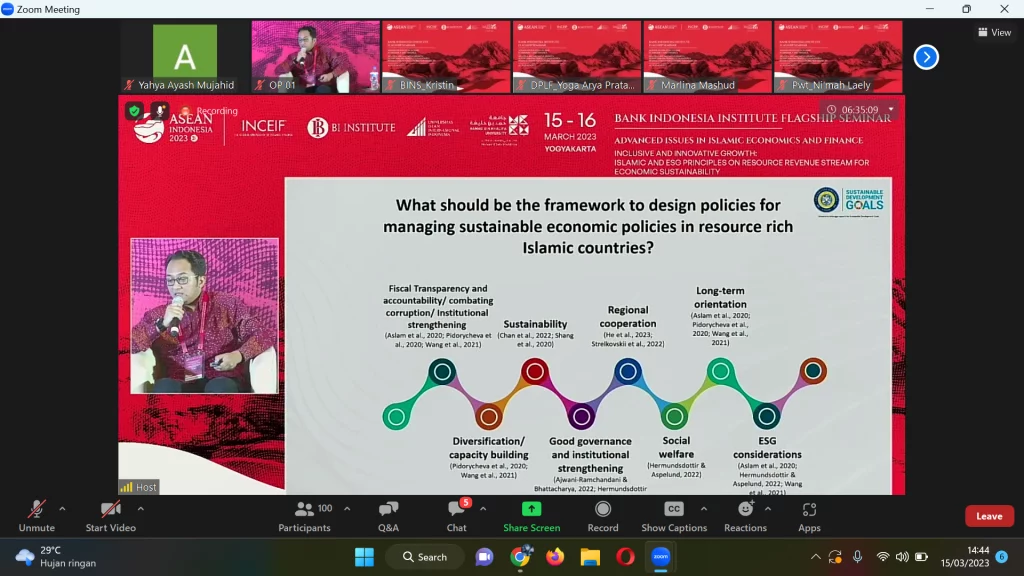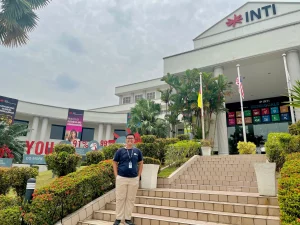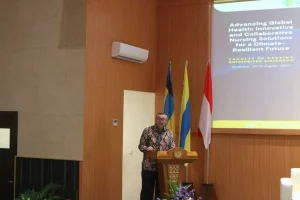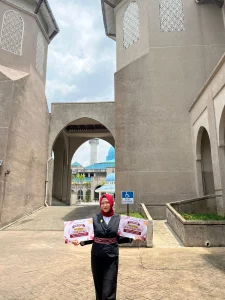UNAIR NEWS – After signing an MoU on the cooperation of the Emancipated Campus program with Universitas Airlangga (UNAIR) in August 2020, Bank Indonesia (BI) Institute invited UNAIR again to collaborate in a Flagship Seminar. The event was held in a hybrid manner, at Ballroom 3, Hotel Tentrem, Yogyakarta and Zoom Meeting on Wednesday, March 15, 2023.
Themed Inclusive and Innovative Growth: Islamic and ESG Principles on Resource Revenue Stream for Economic Sustainability, this seminar aims to increase understanding of the relevance of sharia and ESG principles in optimizing economic strategies for countries rich in natural resources.
To achieve this goal, the BI Institute invited Bayu Arie Fianto SE MBA PhD, Head of the Department of Islamic Economics UNAIR and head of UNAIR’s SDGs Center, as one of the speakers.
In his presentation, Bayu said that the National Development Planning Agency (Bappenas) has set 216 concrete indicators to measure the progress of achieving SDGs in Indonesia. These indicators cover four main pillars: social, economic, environmental, and law and governance. The achievements have been relatively constant, where since 2015, 135 indicators or around 62.5 percent have been fulfilled. However, he felt that there is still a lot to be done in the future.
“The number of certified teachers, which is only 26 percent, problems with the quality of the clean water index, high poverty ratio, and discriminatory policies in the last 12 months will be our focus after this,” he said.
The discussion, hosted by the Qatar Foundation Associate Professor, Mohamed Eskandar Shah, discussed the correlation between Islamic fiscal policies and global economic growth, especially for countries with potential natural resources.
“In Islamic law itself, three sectors are ‘unlawful’ to be owned by the private sector, including water, food, and energy. Instead, because it concerns the common good, only the government has the authority to control these sectors,” said Bayu.
Meanwhile, taxes in fiscal policy have been controversial because some Muslims consider these policies unfair and often misdirected. A zakat system seems to answer their concerns because apart from being collected from certain financially able groups, zakat also has a specific target.
“In my opinion, zakat is the best alternative in redistributing wealth, the subject is clear, the object is clear based on nisab and haul, and the target is clear, namely nine asnaf,” said Bayu.
He added that fiscal management must align with Islamic principles and refer to the SDGs that emphasize collective welfare. The principle in question is moderation in budgeting and the priority scale of spending, which must prioritize dharuriyat or fulfillment of basic needs that cover five aspects: religion, soul, intellect, lineage, and assets.
In addition, to support the SDGs, the government can intensify works of State-Owned Enterprises, especially in managing and distributing natural resources, so that their selling value on the global market is higher and all Indonesian people can enjoy the results. On the other hand, the government must start decisively eliminating and evaluating unproductive state revenues and expenditures.
“Finally, as the largest Muslim country in the world, Indonesia needs to optimize zakat and waqf, which are one of the most important fiscal instruments for the wheels of the national economy,” he concluded. (*)
Author: Yahya Ayash
Editor: Binti Q. Masruroh









